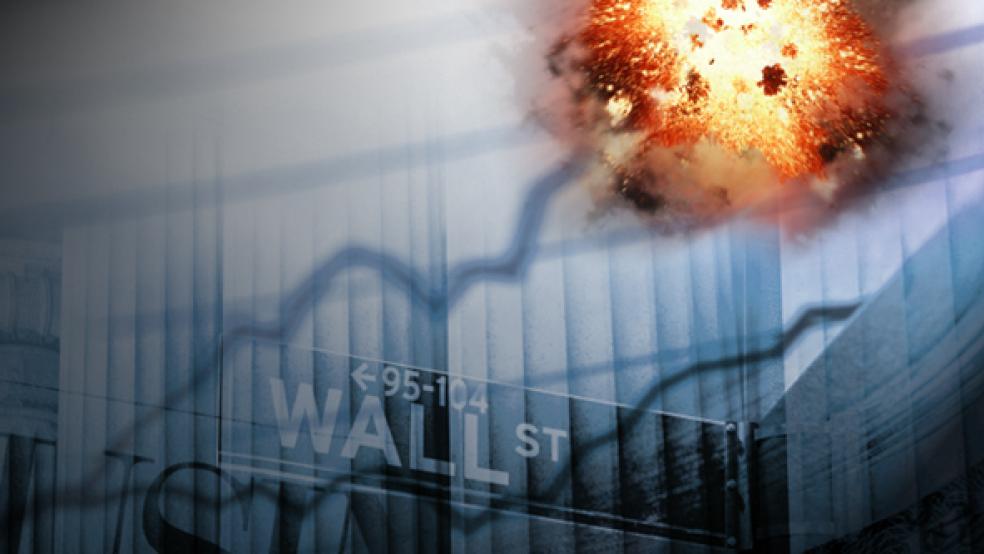As the NFL dug into its sixth week of action on Sunday, the Senate reached the equivalent of the two-minute warning on the debt limit.
In just four days without a debt ceiling increase, the government will enter a financial danger zone on Thursday—at which a single transaction could leave Washington overdrawn and defaulting on routine payments for the first time in the nation’s history.
Senate Majority Leader Harry Reid (D-NV) and his Republican counterpart Mitch McConnell of Kentucky failed to hammer out an agreement on Sunday over reopening the government and increasing the government’s $16.7 trillion borrowing authority.
The two spoke by phone on a deal that would still need to be fast-tracked to clear the Senate—which Tea Partiers could try to stop—and then move to the House, where the Republican majority are seeking concessions on Obamacare that Democrats refuse to make.
All that remains certain is that discussions continue, attempts to compromise have been rejected, and a perilous deadline draws ever closer.
“Our discussions were substantive, and we’ll continue those discussions,” Reid said on the floor yesterday. “I’m optimistic about the prospects for a positive conclusion to the issues before this country today.”
Even Republican with vague hope of a deal harbor uncertainties.
“We will see our way through this, but the last 24 hours have not been good,” Sen. Bob Corker (R-TN) told “Fox News Sunday.” “It’s not clear how this will end.”
Republican senators had reasons to doubt by the middle of Sunday afternoon after Reid nixed a compromise plan from Sen. Susan Collins (R-ME).
Her plan would have raised the debt limit through next February and funded the government through the end of March, but Democrats prefer a larger debt limit and a shorter extension of government funding in order to put more pressure onto the GOP, according to The Washington Post.
The failed compromise would also have delayed for two years the medical device tax from Obamacare and given federal agencies more flexibility in managing the automatic sequestration cuts. Democrats want to undue some of the spending reductions from the sequester and Reid has taken a hard line against changing Obamacare.
“It’s time for Democrat leaders to take ‘yes’ for an answer,” McConnell said in response to the Collins plan getting stiff-armed, before then talking with Reid by phone. His remarked echoed Reid’s own complaint that House Speaker John Boehner (R-OH) cannot get to yes.
The Democratic rejection came a day after Republicans blocked on Saturday a procedural vote—which needed a 60 vote supermajority—to raise the $16.7 trillion debt ceiling by $1.1 trillion, enough to hold off another vote on U.S. borrowing authority until after the 2014 elections.
THE COUNTDOWN
The critical element in all of this has become the clock. Reid and McConnell must first reach an agreement, then get it through an expedited process in the Senate.
Sen. Ted Cruz (R-TX) and his allies could try to block the approval of fast track status, a move that’s not out of the realm of possibility for a freshman lawmaker whose failed plan to defund Obamacare contributed to the nearly two-week government shutdown. Cruz has called on his party to stand and fight, a position that has both jeopardized the Republican brand across the country and endeared him to the most conservative and energetic voters in the Republican base.
The freshman senator won the presidential straw poll at the Value Voters Summit on Saturday with 42 percent, crushing another possible presidential aspirant Sen. Rand Paul (R-KY), who received just 6 percent.
RELATED: EARNINGS MAY BE ECLIPSED BY D.C. DEBT DRAMA
“In my view, the House of Representatives needs to keep doing what it’s been doing, which is standing strong,” Cruz said in a speech at the event. “And that is the model for every other fight. We need no more Washington solutions.”
However, Cruz’s personal victory could be part of a broader Republican loss. According to a recent poll by NBC News and The Wall Street Journal, 53 percent of the country blames Republicans for the shutdown, compared to just 22 percent who say its President Obama’s fault. Just 24 percent of the country views the GOP favorably.
This has created a troubling dynamic on Capitol Hill, giving Democrats such as Reid less of an incentive to compromise if the current stalemate only increases public disapproval of Republicans. At the same time, it is almost impossible for House Republicans’ reputation to sink any further, giving them little upside to retreat.
Sen. Chuck Schumer (D-NY) warned on Saturday that the economic gravity of a possible default could take hold.
“This is playing with fire,” he said. “We don’t know when the markets will react to this. You can’t say it will be no sooner than next Thursday. I worry on Monday that when the American markets open.”
When stock futures began trading on Sunday, the S&P 500 index almost instantly plunged.





